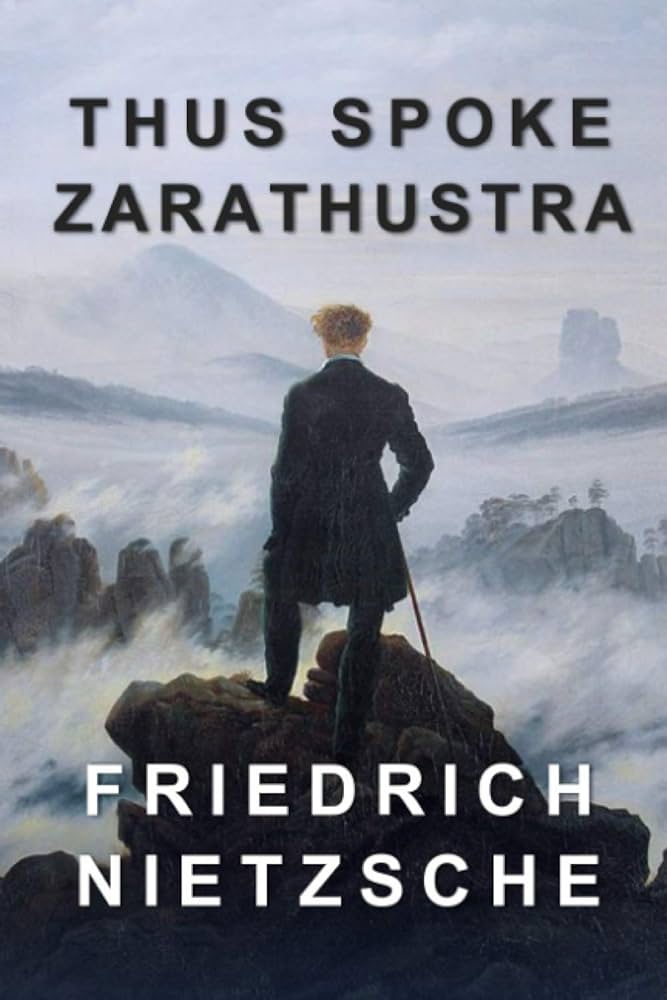Table of Contents
A Gospel of the Will
Few books in the Western canon burn with the same poetic fire and philosophical depth as Thus Spoke Zarathustra. First published in parts between 1883 and 1885, Friedrich Nietzsche’s most enigmatic and exalted work blends parable, prophecy, and aphorism into a searing proclamation of a new human ideal. With its biblical cadence and mythic character, the book is not a treatise but a testament—delivered by Zarathustra, Nietzsche’s fictional prophet, who descends from his mountain solitude to share what he has seen: the death of God, the dawn of the Übermensch, and the eternal recurrence of all things.
This is not philosophy in the analytic sense. It is not designed to persuade. It is a philosophical revelation—symbolic, recursive, maddeningly elusive—and yet unmistakably profound.
Core Themes: God, Man, and Becoming
The Death of God
Nietzsche’s famed pronouncement—”God is dead”—does not merely reject religious belief. It signifies the collapse of metaphysical grounding for truth and morality in the modern age. For Nietzsche, this void opens a terrifying freedom: humanity must now invent its own values.
Zarathustra, unlike traditional prophets, doesn’t bring divine commandments. He brings a creative imperative: humankind must become its own lawgiver.
The Übermensch (Overman)
The central idea of the Übermensch is often misunderstood. Nietzsche does not describe a biologically superior being, but a new mode of life—a figure who embraces struggle, affirms existence without illusion, and lives as a creator of value. The Übermensch is the antithesis of the “last man,” Nietzsche’s contemptuous term for the comfortable, conformist modern who avoids risk and suffering.
The Übermensch is the human being who has overcome nihilism.
Eternal Recurrence
Zarathustra’s most difficult teaching is that of eternal recurrence—the idea that everything that happens will happen again, endlessly, with no final purpose or redemption. Nietzsche presents this not as cosmology, but as a test of affirmation: can you love life so deeply that you would will its return eternally, exactly as it is?
To live under this ideal is to affirm existence without conditions, without promise of paradise or ultimate justice.
The Will to Power
Threaded through the text is Nietzsche’s metaphysical and psychological concept of the will to power—not a will to dominate others, but a fundamental drive toward growth, overcoming, and self-transcendence. In Zarathustra, this manifests as a call to creative self-becoming: “What is great in man is that he is a bridge and not a goal.”
Literary Form: A Philosophy as Myth
Unlike The Birth of Tragedy or Beyond Good and Evil, Thus Spoke Zarathustra is written in a quasi-biblical style, deliberately echoing the King James Bible and prophetic texts. This form is not ornamental—it is functional. Nietzsche means to replace the old religious imagination with a new mythos rooted in life-affirmation rather than ascetic denial.
Each chapter is like a poetic homily: often contradictory, rich in metaphor, and meant to be felt more than dissected. Nietzsche uses Zarathustra not as a mouthpiece, but as a mirror—reflecting back our deepest fears and aspirations.
Philosophical Context and Influence
Nietzsche’s work stands in opposition to the Platonic-Christian tradition, which privileges the eternal over the temporal, spirit over body, reason over instinct. In place of absolute truth, he offers perspectivism; in place of moral law, he urges value creation. Yet his work deeply engages with Schopenhauer, Heraclitus, and even echoes elements of Eastern thought—particularly in his embrace of impermanence and transformation.
Zarathustra profoundly shaped existentialist and postmodern philosophy. Heidegger called it “the greatest philosophical work ever written.” Camus, Derrida, and Foucault all drank from its paradoxical stream. Its cultural reach extends to art, psychology, literature, and even cinema (notably Kubrick’s 2001: A Space Odyssey, which opens with Richard Strauss’s tone poem Also sprach Zarathustra).
Relevance Today: Becoming in the Face of Collapse
Nietzsche’s warnings about nihilism, herd conformity, and spiritual stagnation are arguably more relevant now than in his own time. In an age of technological saturation, ideological echo chambers, and crisis fatigue, Zarathustra’s call to willful self-overcoming rings with renewed urgency.
Moreover, Nietzsche’s critique of moral certitude challenges today’s increasingly polarized ethics. He offers no program, no easy fix—only the demand to forge meaning in a world where traditional absolutes have crumbled.
Strengths and Limitations
Strengths:
- Literary Depth: A masterful blend of poetry and philosophy unlike any other.
- Transformative Potential: Inspires readers to confront their deepest values and fears.
- Foundational Influence: Core to understanding modern and postmodern thought.
Limitations:
- Ambiguity: Dense metaphors and contradictions can frustrate those seeking clarity.
- Misinterpretation Risk: Concepts like the Übermensch and will to power are often misunderstood or misused.
- Philosophical Isolation: Difficult to grasp fully without context from Nietzsche’s other works and historical influences.
Best Audience Fit
This book is ideal for:
- Advanced readers in philosophy, literature, or theology
- Artists, poets, and creatives interested in existential themes
- Readers undergoing personal or intellectual transformation
- Those prepared to wrestle with ambiguity rather than seek answers
TL;DR
Thus Spoke Zarathustra is not read—it is endured. It is not meant to convince but to provoke. For readers ready to let go of doctrinal certainties, it opens a space for radical honesty and existential freedom. Zarathustra’s journey is a mirror for our own: the descent into the valley of doubt, the solitude of the thinker, the laughter of the awakened.
Nietzsche once wrote, “One must still have chaos in oneself to be able to give birth to a dancing star.” This book is chaos and starseed alike—a testament to the possibility of becoming more than what we are.

Leave a Reply